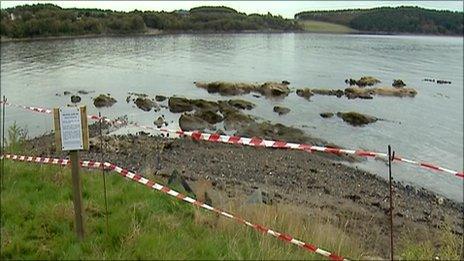MoD given deadline over radioactive Dalgety Bay beach
- Published

The shore at Dalgety Bay has been cordoned off for further investigations
Scotland's environmental watchdog has given the MoD until the end of February to devise a plan to make safe a Fife beach contaminated with radioactivity.
Sepa said that if the deadline was not met the land at Dalgety Bay would be declared officially contaminated.
The radiation is thought to be linked to the remains of wartime aircraft buried in the area.
The MoD said a meeting on the issue had been constructive and it was working with locals and the agencies involved.
Over the past few months more than 200 radioactive particles have been discovered in the area.
Part of the shore was cordoned off last month for further investigation into radioactive sources.
The radioactivity is thought to come from dials of World War II aircraft.
Dalgety Bay hosted a wartime airfield, where many aircraft were dismantled.
Community risk
The dials in the planes were coated with radioactive radium so they could be read at night.
They were later used as landfill and it is thought that erosion has led to leaks into the sea which have washed onto the foreshore.
Following a meeting between Sepa, the MoD and members of the local community, Sepa's radioactivity specialist Dr Paul Dale told BBC Scotland: "We have set out a timetable that we expect a full draft of the MoD's plan by the end of January with a final set of plans by the end of February.
"If that isn't forthcoming, Sepa will continue with its progress to designate the land as contaminated by the end of March."
If Sepa did declare the area as "Radioactive Contaminated Land", it is understood this would be the first time it had happened in the UK.
An area of high radioactivity is only legally declared as contaminated if there is not a suitable action plan in place to deal with the problem.
Environment Secretary Richard Lochhead said: "It is deeply disappointing that this situation has arisen as a result of inaction from the Ministry of Defence.
"I have urged the MoD on a number of occasions to take immediate action and come forward with credible plans to investigate the source of the contamination at Dalgety Bay.
"I would have expected the level of radioactivity to have impelled those responsible to do the right thing for the people of Dalgety Bay and clean up this mess."
He added that despite not receiving a response from the MoD to his letter in October, he would be writing again to Defence Secretary Philip Hammond.
"I am keen to establish the precise nature of their commitment," Mr Lochhead said. "The Scottish government prefers that a voluntary approach is taken by the MoD."
In a statement, the MoD said: "We had a constructive meeting today and we will continue to work with the Scottish Environment Protection Agency (Sepa), the Scottish Executive and the Dalgety Bay Forum."
Independent experts
Radioactive particles were first found on the beach more than 20 years ago.
However, there has recently been an increase in the number of particles found, with more than 100 discovered since the beginning of October.
One particle was 10-times more radioactive than those found previously.
Sepa recently said that if exposed through erosion the material could pose a risk to the community.
It also revealed that further work was carried out last weekend to remove three more sources of radiation from the beach at Dalgety Bay, including one "which gave an extremely high" reading of radioactivity.
Sepa also announced that it plans to establish a group of independent experts in radioactivity to help provide advice and guidance on the contamination at Dalgety Bay.
Former Prime Minister Gordon Brown earlier called for urgent action to tackle the problem.
- Published12 November 2011
- Published8 November 2011
- Published31 October 2011
- Published26 October 2011
- Published17 October 2011
- Published16 October 2011
- Published13 October 2011